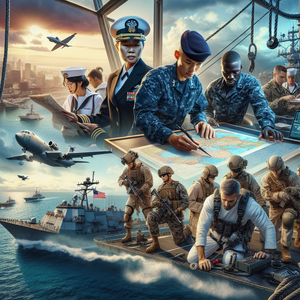Beyond the Paycheck: The Real Value of a Navy SEAL's Career

The cornerstone of a Navy SEAL's career is the rigorous training regimen they undergo. Basic Underwater Demolition/SEAL (BUD/S) training is infamous for its intensity, pushing candidates to their physical and mental limits. This training not only builds physical endurance but also cultivates mental resilience, adaptability, and exceptional leadership skills. The lessons learned during this demanding process have long-lasting implications. For instance, former SEALs frequently transition into high-stakes environments in the corporate world, where the ability to lead, make quick decisions, and handle pressure is paramount. Companies such as Google and Amazon have recognized the unique skill sets that veterans bring, often preferring them for leadership roles. A notable example is former SEAL Jocko Willink, who co-founded a leadership consulting firm after retiring, leveraging his military training to guide corporate teams. His success exemplifies how the qualities honed through SEAL training can provide a competitive edge in civilian careers.
The Bonds of Camaraderie
Equally important to the Navy SEAL experience is the camaraderie formed among team members. The shared trials of intense training and deployment foster deep connections that often last a lifetime. This brotherhood serves as a crucial support network, essential for mental health and resilience, especially during the challenging transition back to civilian life. Research indicates that strong social connections can significantly reduce stress and enhance overall well-being. For SEALs, the camaraderie built during their service provides a sense of belonging that is difficult to replicate in civilian life. Many veterans report that their fellow SEALs played a vital role in helping them navigate the complexities of post-service life, reminding us that the bonds forged in service extend far beyond financial considerations. This support network not only enhances their personal lives but also contributes to their overall mental health, reducing the risk of PTSD and other service-related conditions.
Career Opportunities After Service
The elite status of a Navy SEAL opens numerous doors for career opportunities post-service. Many former SEALs transition into high-demand fields such as security consulting, law enforcement, and entrepreneurship. The skills acquired during their military careers—strategic planning, crisis management, and leadership—are exceptionally transferable and sought after in various industries. For example, former SEALs have made remarkable strides in the tech sector, taking on roles that leverage their operational strategy expertise. Companies like Microsoft and various cybersecurity firms actively recruit veterans, recognizing the value of their experience. Additionally, many retired SEALs have established their own businesses, tapping into their leadership training and military backgrounds to create successful ventures in areas such as outdoor adventure services and leadership development. This entrepreneurial spirit demonstrates how the skills gained during military service can lead to lucrative and fulfilling post-service careers.
While the financial compensation associated with a Navy SEAL's career is significant, it is crucial to appreciate the broader, non-monetary benefits that this path offers. The transformative training, profound camaraderie, and diverse career opportunities that arise from serving as a Navy SEAL contribute to a rich and fulfilling life, both during and after military service. As we reflect on the sacrifices made by these elite warriors, it becomes clear that their value transcends the paycheck. The lessons learned, the bonds formed, and the doors opened through their service create a legacy that continues to impact their lives and the lives of those around them. For aspiring SEALs, understanding this holistic value provides a deeper motivation to pursue a path defined not just by salary but by purpose, growth, and the relentless pursuit of excellence. Ultimately, the journey of a Navy SEAL is one of unparalleled development, lasting friendships, and boundless opportunities, making it a career that is truly beyond the paycheck.
Leadership Development Consultant
Leadership consulting firms, corporate training organizations, Google, Amazon
Core Responsibilities
Design and implement leadership training programs tailored for corporate clients.
Facilitate workshops that enhance team dynamics and communication skills.
Assess organizational needs and recommend strategies to improve leadership effectiveness.
Required Skills
Strong background in leadership principles, ideally with experience in military or high-stakes environments.
Exceptional presentation and communication skills.
Ability to analyze and adapt training methods based on diverse team dynamics.
Crisis Management Specialist
Fortune 500 companies, government agencies, nonprofit organizations
Core Responsibilities
Develop and implement crisis response plans for organizations in various sectors.
Conduct risk assessments and create mitigation strategies to minimize impact during emergencies.
Train teams on effective crisis communication and management techniques.
Required Skills
Experience in high-pressure decision-making environments, such as military or emergency services.
Strong analytical skills to evaluate risks and formulate strategic responses.
Excellent interpersonal skills for coordinating with various stakeholders during crises.
Security Consultant
Private security firms, corporate security departments, government agencies
Core Responsibilities
Assess physical security measures and provide recommendations to enhance safety protocols.
Conduct threat analysis and vulnerability assessments for clients' facilities.
Develop and implement training programs for staff on security awareness and emergency procedures.
Required Skills
Background in military service or law enforcement, with specialized knowledge in security operations.
Strong analytical and critical thinking skills.
Excellent communication abilities to convey security concepts to non-experts.
Entrepreneurship Coach
Business incubators, coaching firms, entrepreneurial organizations
Core Responsibilities
Guide aspiring entrepreneurs through the process of starting and managing their businesses.
Provide mentorship in areas such as strategic planning, financial management, and marketing.
Organize workshops and networking events to connect entrepreneurs with industry experts.
Required Skills
Experience in launching and running a successful business, preferably with a background in high-stakes environments.
Ability to communicate complex concepts in an accessible manner.
Strong networking skills to help clients connect with resources and support.
Corporate Trainer
Corporate training firms, large corporations, educational institutions
Core Responsibilities
Develop and deliver training programs that enhance employee skills and performance.
Evaluate training effectiveness and adjust programs to meet organizational goals.
Collaborate with management to identify training needs and implement solutions.
Required Skills
Strong background in instructional design and training delivery, ideally with military or corporate training experience.
Excellent facilitation and presentation skills.
Ability to engage diverse audiences and adapt content for varying learning styles.


